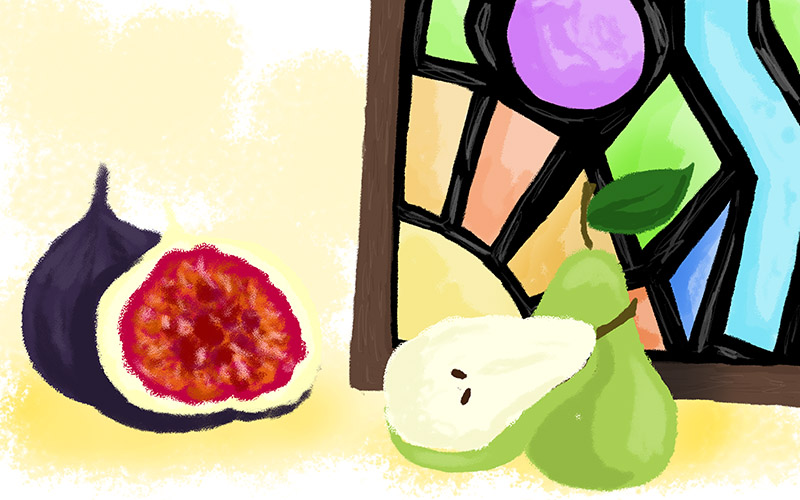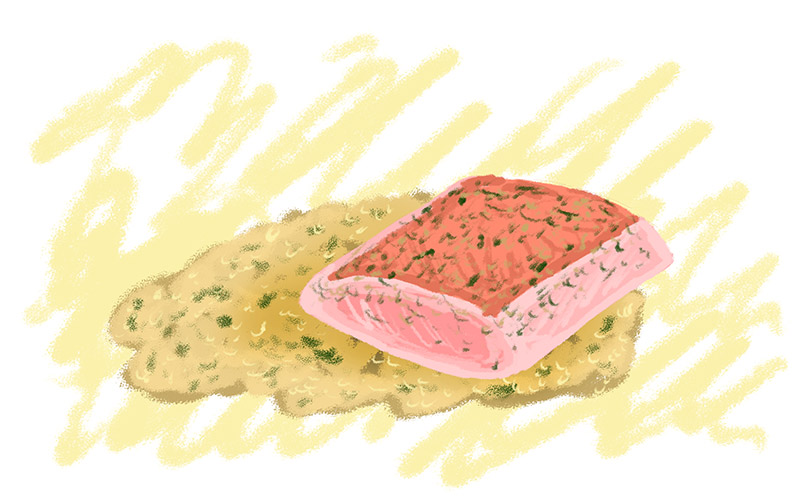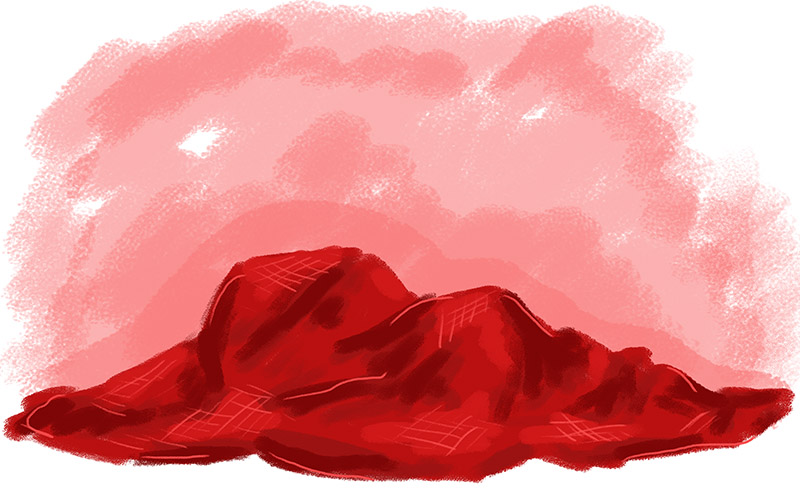This story includes instances of self harm.
I shot to the surface of post-grad life just below the Verrazano Bridge, my lungs choked with the bay’s refuse. College had been all riptides and sea squalls that dismantled my former identity centered around childhood’s structure. I’d once considered myself responsible, but that sense waned when circumstances shifted significantly for the first time in my life. College found me living a slapdash existence, propped up by the certainty pre-paid room and board offered. No one told me I should be saving money for what came next. As graduation mounted, I struggled to secure gainful employment and the funds necessary for my first apartment. I was accustomed to scrounging, I’d worked several jobs at a time alongside my full course load. Drawing upon a failsafe, I managed to arrange a temporary tenancy with my best friend Christina, who I’d met in a senior year art history class.
Settling into the attic apartment of Christina’s childhood home in Bensonhurst, Brooklyn, I felt like a kid playing grownup. Brackish sea air poured into my sparsely furnished rooms through embroidered curtains on loan from my landlady, Christina’s mother. The breeze animated my pastel walls with potential. From my bedroom, I padded out to an expansive balcony to smoke American Spirits in full view of the Coney Island spire. The night I moved in, Christina and I walked to a park with blazing views of the Verrazano’s span above Gravesend Bay. For the first time in my life, the vast expanse of my future loomed ahead. “What the fuck am I going to do?” I thought. My mind pulled a blank.
Williamsburg was my entire New York in high school. My age-old affinity for the neighborhood originally inspired my move to this city. I was weird in a weird way at 14, with no niche interests that could garner my acceptance within a well-defined clique. I’d tried on countless stereotypes since middle school to no avail; preppy, skater, goth. When, as a freshman, an upperclassmen called me a “total hipster” for wearing non-prescription glasses, I found myself entranced by the title’s pre-requisites: all obscure music and ironic jokes. Finally, I’d found a role that fit. Every listicle related to the hipster trend extolled Williamsburg as ground-zero for my new lifestyle.
Williamsburg was my entire Brooklyn in college. I found the rest of New York rather lacking in the genuine creative spirit I’d come in search of. Maybe I was just threatened by my first encounters with cosmopolites. Either way, Manhattan was a bust. As the most glamorous of the city’s five boroughs, Manhattan was the first to become too expensive for a layperson’s participation. Wealthy individuals populate the borough’s towering apartments, while businesses cater to their whims with overpriced novelty. The only other institutions equipped to survive this exorbitant landscape are national chain retailers with pockets deep enough to fish rent dues from.
Brooklyn, I thought, was for the real people who stayed in New York to exercise their creativity and explore themselves. Throughout college, I did my most memorable drinking off the first five L train stops because they hosted the only portion of the city that I respected. Even then, the streets surrounding those stops were heavily ensconced in the process of gentrification; I couldn’t tell it at the time though, couldn’t understand what the new Sephora, Whole Foods, and Apple Store two blocks below the Bedford stop meant in terms of the city’s story. All I knew was that I’d made it to the promised land. There, my feet barely wet, my mind’s eye was deceived into believing that I was submerged. I foolishly believed I was a ‘Brooklyn girl’ because every week I got blackout drunk at several bars on Bedford and Driggs that habitually neglected to ID.
Bensonhurst was not like Williamsburg. There were no up-cycled vintage boutiques, no panoramic views of the Manhattan skyline, no DIY music venues disguised as garages. By comparison, I believed, Bensonhurst was the Des Moines, Iowa of my sacred Brooklyn, New York. 30 minutes outside of Manhattan via the D train, formerly the borough’s premier Italian neighborhood, I learned that I lived in one of its last remaining strongholds. Our yard, littered with fig and pear trees in the front and grapevines snaking over a stained glass patio in the back, stood like an oasis amongst the drab skeletons of homesteads since wilted.

In the sudden, jarring absence of work that came after college graduation, I whiled early summer days away with strolls from our home to Coney Island. Walking occupied the swaths of unstructured time that mocked me while introducing me to this unfamiliar portion of Brooklyn that I’d now call home.
My favorite route brought me down residential Bath Avenue until it joined with Stillwell under elevated train tracks. After several blocks of shade and rattling subway cars, Stillwell would open to an unyielding industrial landscape doused in the unadulterated afternoon sunlight. “Is this really still Brooklyn?” I’d wonder internally. Everything I found along this walk served a utilitarian purpose. Houses and streets, concrete on concrete, the area made no attempt at pretense. It was novel, in a way, and armed with the belief that few transplants came to know this facet of the city’s identity so intimately, I began to feel like an explorer. Where Stillwell intersected Neptune Avenue, I knew Coney Island was nigh. The landscape acquired frenetic colors. I could hear Top 40 hits and the clamor of amusement rides. Eyes straight ahead, I’d beeline the remaining distance to the boardwalk and throw my gaze into the Atlantic Ocean’s soothing embrace. “Smile Like You Mean It” by The Killers blared through my headphones. I convinced myself this Brooklyn had its own ‘cool,’ distinct from the iteration I’d originally ascribed to it.
Prior to graduation, I created a color-coded spreadsheet documenting my correspondence with the 70 positions I’d applied for. It was summer, I lived at the beach, and I’d just failed 70 times, an experience which took its toll on my psyche. “Bartending,” I decided. “Just for the summer.” I interviewed at Ruby’s on the Coney Island boardwalk rather naively, unaware that it’s a legend among seasoned drink slingers. I didn’t get the job.
Later that week, Christina and I spent an evening at Coney Island’s Place To Beach sipping weak Long Island Iced Teas and blowing cigarette smoke away from the bar’s other patrons. I’d acquiesced to the tempting potential of a Lana Del Rey summer, rife with cheap beer, sandy nights, and the kindness of strangers. Still, even the bottom shelf swill costs something, and I needed money. “Are you guys hiring?” I asked our server. “Try Bay Ridge,” he advised, before rattling off a list of notable restaurants in the nearby enclave.
The establishment I came to work at intimidated me on sight. Its lighting brooded over dark wood and red leather upholstery. “I heard you might be hiring,” I timidly inquired at the hostess stand, each word rebelling against my activated instinct for flight. A stunning girl who looked like she would have bullied me in middle school replied, “yes, let me introduce you to our manager Stan.”
I began work later that week. Fresh-faced and straight out of school, I was eager to perform. “You’re so cute,” my new coworkers mused. “Just wait, you’ll see,” I thought to myself. The dichotomous nature of my personality thrilled me. I’d managed to graduate college with a 3.6 GPA and work numerous jobs all while maintaining an addict’s reckless recreational habits thanks to my immense proclivity for compartmentalization. The various cubbies I’d painstakingly filed my personality traits into allowed me to thrive in each role I played, whether it was student, intern, or party girl. For every ounce of demure femininity I felt required to exude in professional settings, another treacherous and ugly side of me lurked below.

I’d worked at Red Robin during my senior year of high school and understood that restaurants require this type of balance. They’re high-stress work environments which dictate that servers must be sweet to their tables and brutal with each other in order to get drink refills and rushed entrees in a timely fashion. Petty dramas abound. As I’d learned to do in any activity that involved possible hostility, I relied on my big-eyed nature to move through the restaurant’s contentious atmosphere without arousing animosity. It was like scoring free drinks at the bar; an innocent smile leads your mark to believe they’re predator rather than prey. I’d learned to hide my intentions, the pro bono substances I was truly after, behind flirtatious curiosity. My strategy worked, for the most part, where I applied my principles to the serving position.
One afternoon, I asked a coworker to take over my tables. I could have finished my shift by seeing them to their conclusion, but I was spent. Alongside the emotional intelligence, a server must practice, customers often fail to note the pure physicality of the job. That first week at work left my feet stinging from blisters in places I didn’t even know feet could form them. “I need to leave, and Stan told me you would take over my section. Is that okay?” I smiled sweetly, assured my coworker sympathize.
“No, but what can I do?” he retorted flatly. My face fell, but I stood there watching Rafael place his customers’ drinks at the point of sale system. Rafael’s mouth was tepid, his eyes downturned with a pointed nose just barely beckoning the same direction. It was only upon studied observation that one might locate the wells of tension; a taut brow and stringent corners on the mouth. Another coworker snapped me out of it. “Do you want a ride home?” she asked.
Vanessa was a few years older and had become my ‘work mother’ almost immediately. “I don’t think Rafael likes me,” I told her as we cruised down 3rd Avenue. In New York’s residential outer areas, people defy popular stereotypes with their preference for driving. The subways, this city’s arteries, are fewer and far between along the outskirts, and the buses are less reliable. “Don’t worry, he’s like that with everyone,” she assured me while merging onto the Belt Parkway at Shore Road.
Vanessa hailed from Gerritsen Beach and possessed a gritty practicality that I coveted. Our conversation meandered to the changes she’d witnessed across South Brooklyn. The popular narrative epitomized by Williamsburg states that wealthy, often Caucasian upstarts are flocking to New York’s neighborhoods, generating the standardization that had once left me disillusioned with Manhattan. However, a reverse whitewashing seems to be sweeping the OUTER outer boroughs as established, middle-class families of European descent increasingly find themselves surrounded by an influx of new ethnicities populating their neighborhoods. “I don’t mind different cultures, I love everybody,” Vanessa told me, “but I don’t understand how people can come into a community that existed long before them, that we built, and make no effort to adapt. They should at least try to assimilate.” That word: assimilate. I hadn’t expected to hear it in a melting pot as infamous as New York. I had no skin in this game because I considered my stay in Bensonhurst a temporary measure. I did, however, have sympathy for these new foreign residents. Their story paralleled my own, a transplant fighting to make her way in a new place.
The portion of my coworkers not born and bred in South Brooklyn hailed predominantly from Mexico and Venezuela. As a result, my Spanish reached its pinnacle that summer. Despite Vanessa’s emphasis on assimilation, I figured it must be painful to find yourself in new country, forced to speak a bulky foreign tongue. While I practiced their language, my coworkers seemed impressed with the material I’d retained from compulsory public education.

I enjoyed the social aspect of serving, the levity our entire staff shared during slow afternoons, but evening rushes proved difficult for my anxiety. Every shift featured at least one episode that brought me to a breaking point. “It’s like puking,” I wrote in my diary at the time. “I may not be doing it now, but I know at some point in the near future, or at least before I die, it’s going to happen again,” I remember the frenzied existential dread that clawed at me while I heaved massive jugs of Sangria up to the cramped bar’s countertop, my colleagues’ anxious bodies snapping and bristling against my brittle boundaries. The bussers caught my eye against the chaos with the way they quietly performed thankless jobs in the sweltering summer heat. Some were clearing tables for a purpose greater than themselves, sending money back home to their families. Others had just arrived, loved ones in tow, and were laying crucial foundations. “Immigrant work ethic,” I muttered to myself, slicing an index finger on a jagged cap and ignoring the pain. If they could do it, so could I.
I sought release from this stress through the same maladaptive coping mechanisms I’d leaned on throughout college. If my undergraduate behaviors were unacceptable for an adult participant in society, neither the restaurant industry nor Bay Ridge itself let me know. Both my coworkers and our customers let loose in the same manners I’d come to favor: liquor and uppers. Bay Ridge appeared family-oriented, and it really was. The people who ate at the restaurants had grown up with each other in the surrounding area. They clapped backs and clinked glasses like family, albeit a decidedly old-school New York City family that knew how to get down. I worked at a favored party spot and gained a small reputation for working my tables with all the charm my shy smile could command. I was welcomed like honorary kin into the neighborhood scene. Several nights a week, I would venture to one of roughly ten popular hangouts, meet some well-established member of the community, and end up in their apartment railing lines until daylight showed its hairy ass.
Even if I was having a more reclusive night, I was bound to encounter someone I knew on the streets. One night, already drunk, I passed by the restaurant on my way to a cheap bar on 97th Street. Two kitchen workers without even a cursory grasp of English yelled to me as I passed by. They were mounting their bikes to head home for the night. “Quiero intentarlo,” I squealed, jumping aboard to ride. They laughed while I learned how hard it is to ride a bike under the influence, and helped me up after I fell over.
“Voy al bar,” I told them while regaining my bearings. “Quieren venir?” They grinned at each other and rolled their bikes alongside me. We didn’t speak a lick of English, my intoxication made me brave enough to prattle on in brazen Spanglish. Where language failed, we danced to fill the void, each of the kitchen workers swinging me around the empty dance floor to jukebox tunes until the bar’s lights went up.
Even my friendship with Rafael blossomed, though only in spurts. Once, we stood next to each other, running customers’ credit cards at the restaurants only terminal. “My commute took so long today,” Raphael sighed, “I come here all the way from Bushwick.”
“You’re so lucky,” I nearly screeched in reply. “I want to move to North Brooklyn so badly.”
Another night, I trained a new waitress while Rafael was working as a food runner. I showed the new girl how to add special instructions on orders, noting that one of our customers would like the fennel sauce with his baked salmon on the side. Rafael chased me down a hallway to ask what I meant. “What do you mean, what do I mean?” I replied. He was fluent in English, he’d moved to the States ten years earlier. “On the side. Like . . . put it beside the salmon,” I explained, struggling to skirt condescension. I never discovered the source of his confusion. “Is he always like that?” my trainee asked. “No, not always,” I replied. “You never know what people have to go home to.”

I had come into work at 6pm that day, after waking up at 5pm. My compartmentalization was wearing around the edges. I no longer chastised myself for arriving at work bleary-eyed and hungover. The rest of my coworkers merged their recreational activities with their professional demands, arriving at work still rolling on MDMA or bragging about previous nights spent at the club. Emboldened by their ability to balance this lifestyle, I surrendered to an attempt at rockstar habits, to no avail. Rafael caught me crying after our tiff. Coke comedowns were a harrowing emotional hazard at that time in my life. He pulled me into the kitchen and enveloped me in his embrace. For a moment, everything melted away. In the next moment, the head chef shooed us out. “We’re working in here, what is this?”
Rafael approached me in the employee locker room at the end of our shift. “I can tell you’re not okay,” he said. “I used to be happy,” I sighed, “I just want to be happy again.” I knew how artificially I’d been smiling all summer, and I missed an old joy from before I lived in New York. “No you don’t,” he replied, “happy people don’t know anything.” Rafael had completely dismissed my pain’s purpose, but I still felt seen by his ability to recognize I held any pain at all. Immediately, I was utterly besotted.
I knew that Rafael was married, that was the least impractical aspect of my attraction. Rather than flirting with him to his face, I opted to get drunk at the restaurant after my shifts. I would quickly change into a revealing outfit, invite some friends, and settle into an outdoor table with a pitcher of sangria. “Look at me, Rafael,” I would think to myself. “Aren’t I cute? Aren’t I fun?” Those nights typically ended with me falling, shattering glasses, and spending my day’s pay at the very restaurant that had doled it out to me. I never knew how I got home.
I began sleeping with guys in Rafael’s circle. I knew his closest friend at the restaurant had a crush on me. Rafael had once told me, “Diego is a good guy. You can count on him.” Diego and I got drunk at an after-hours bar in Sunset Park before heading back to my apartment. Fully loosened, I confided my affections for Rafael. “That guy? Are you serious?” He spat back. “I thought he was gay!” “Some friend,” I thought. Diego’s treason made it easier to justify using him. “Listen Diego,” I slurred, “I’ll sleep with you on one condition: you have to tell Rafael how good I am.” And so we did.
A few weeks later, after attending a Mac DeMarco concert with a college friend at The Bowery Ballroom, we Ubered to my restaurant in Bay Ridge for burgers and fishbowls. It was a farcical choice on my part as her host; the restaurant’s location was ridiculously out of the way between the venue and my apartment. However, my decision served two purposes: first, I knew they wouldn’t card my underage friend because I worked there, and second, I wanted to peacock for Rafael. Safely seated, my friend eschewed all thirty ounces of the concoction in front of us, a blasphemous elixir of saccharine watermelon juice and flavored vodka. Always thirsty for anything above 20-proof, I sucked the entire thing down with ease.
I’ve never felt as low as I did the next day. My binging cycles were catching up to me. I knew I’d done something unfortunate the night before, but I didn’t know what. Showing up to the restaurant at all was probably too bold a move. I struggled through my brunch shift, fumbling over every appetizer order. By 3 pm, with the end finally in sight, a 19-year-old hostess named Mandy approached me with peak hostess energy, minxish and conniving. “I can see it now,” she whispered, “the chemistry between you and R.”
My faculties force-terminated. Fuzzy blackout memories rushed forth with indeterminate clarity. When I’d woke up that morning, I’d thought it was a dream, but in reality I had truly told the least trustworthy person possible my worst secret, and I was in no condition to handle the fallout. Word spreads fast in these places. My coworkers began approaching me, asking if it was true. “Is what true?” I tried to innocently reply, but the flush in my cheeks sold me out.
Fight or flight literally ejected me from the establishment. I refused to return to drop the check at my final table. An older, maternal coworker named Donna noticed me outside during her cigarette break. “What are you doing after work? Do you want to get a drink?” I asked her. This was a shitty situation. This was the kind of situation that would lead anyone to drink. I deserved it, I reasoned. We agreed to meet at a barebones watering hole called Hideout.

I regaled Donna with the entire narrative of my ill-fated longing. I also told her that I was worried about my drinking, and we resolved that I would only spend the cash I’d made from tips that day. We sat outside smoking and dissecting the situation with Rafael on the bar’s back patio. Some people from the neighborhood fired up a grill and offered hot dogs with fixings to pair with our gin and tonics. When we needed refills, I would go inside to fetch fresh drinks, buying extra shots on my debit card without Donna’s prying eyes.
I’d thought that the only thing separating me from Rafael was his spouse, but Donna told me that Rafael had actually been in love with her at one point, a crush bordering obsession. It wasn’t his spouse, it was me. He would never love me, for some reason I couldn’t pinpoint. I feared it was the same nameless reason that I would never love myself, that I would never achieve genuine happiness.
Dealing with the double blow, I parted ways with Donna and moved on to another bar I liked. Delia’s is a sensual spot with an exotic aura. I laid out on one of its pillowy couches and procured shrimp dumplings, Nutella crepes, and an Aperol spritz. I texted another male coworker I’d been flirting with. Gio arrived soon after. He had a marine’s body and he had just moved to New York from Los Angeles with his fiancee. After drinks, we bought a six-pack of IPA’s and headed for my annex. I watched myself go through the motions, beckoning him out to my balcony. He began massaging my feet.
I wasn’t blacked out, but the progression of events had become so formulaic that I didn’t even notice their passage. After finishing, Gio ordered a car home. I donned a stiff red dress I’d bought at L Train Vintage and found myself alone in the apartment. My drinking required an audience, there was nothing more debilitating than being alone in that state. My loneliness bared its fangs with the realization that no matter how many happy couples I tried to steal love from, it would never alleviate my inability to find it for myself. Next, scorn assaulted. I felt vengeful against everyone who had betrayed my trust or failed to understand my suffering. I started with eyeliner, playing 3oh!3’s “I Can’t Do it Alone” on repeat while I smeared black lines in raccoon rings. My new look didn’t feel sufficient. I needed aggressive action.
My eyes fell on the cheap razor sitting in my shower. I picked it up and paused for half a beat to contemplate my relationship with self-harm. I’d had friends who cut themselves throughout high school and college. I’d always revered their bravery in a grotesque way. I shared their pain, but mine felt more impotent. I could never bring myself to experience actual pain on its behalf. To make this choice would mean joining their ranks. My inner turmoil would achieve a new level in its physical manifestation.
I made the first swipe at my left forearm. The razor’s contact left a white streak amid my baked summer tan, filling me with dread. There was no blood, I couldn’t even cut myself correctly. In the next moment, a flush of red filled the wound. Intoxicated with power, I worked up my left arm, hacking away, testing how hard I could handle. I couldn’t feel the pain, but I felt metal as fuck. This would show my coworkers. Everyone would understand what I’d been silently carrying all this time. Soon, there was nowhere left to cut.
I considered jumping off the third floor balcony outside my door, but doubted the impact would be sufficient to kill me. Furthermore, I didn’t want to inconvenience or traumatize my landlady, who had gone out on a limb to spare me a humiliating post-grad return to my hometown in Pennsylvania. I thought about calling an Uber to take me to the Verrazano so I could jump from there, but laziness alone saved me. I was drunk-drunk; I’d only picked at the feast I’d ordered at Delia’s despite spending the whole day rushing around at work. Before I could make any further rash decisions, I passed out draped in a half-bloodied towel.

I awoke 20 minutes before the following morning’s brunch shift and leaped into the previous day’s work outfit. It wasn’t until I slid into my Uber’s back seat that the reality of my actions came into focus. My regulation dress shirt clung to the new, weeping wounds. Every movement tore off their gruesome adhesive. After arriving at work, I shut myself in the broom closet, a favored hideaway amongst our staff, and Vanessa followed. Tears welled in my eyes while I told her what I’d doe, praying for a modicum of sympathy. “I’m so disappointed in you,” she chastised.
Later that week, I returned home to Pennsylvania to visit my family before beginning a new retail job on the Upper East Side. I’d received the job offer during one of the rare days that Rafael flirted with me. I’d been so hopped up on cloud nine that I floated through not only my assigned section, but my colleagues’ as well. One impressed customer beckoned me over. “I love the way you work,” she gushed. “I never do this, but would you be interested in luxury retail?” I received my offer letter soon after.
My mother and I paged through stores at the Hershey Outlets, 40 minutes from the town that had raised me. Though our relationship had been rocky throughout my childhood, I was the only girl in my family, and always bonded with my mother while shopping for clothes. She began picking out dresses. I knew that if she saw my arms in their mangled state, she would freak out, make me move home, maybe even pass away before my very eyes. Rather than telling her the truth, I derisively turned down the short sleeve options that would expose my secret. “Just try this on,” she entreated me regarding a sleeveless black sheath. “No mom, I hate it, I don’t even want to take it in,” I shot back. Her expression looked pained. It killed me. The dress was cute.
In my second week at the new job, one month after my incident, I accidentally wore a sleeveless dress around a new coworker. My wounds had healed, but noticeable white scars prevailed. “What is that?” she asked. “My roommate has a cat,” I breezily replied. Enjoying the opportunity to needlessly elaborate upon my lie, I told her the feline helped protect our garden from snooping vermin. “Did you know I live in one of South Brooklyn’s last Italian strongholds?” I began. •




